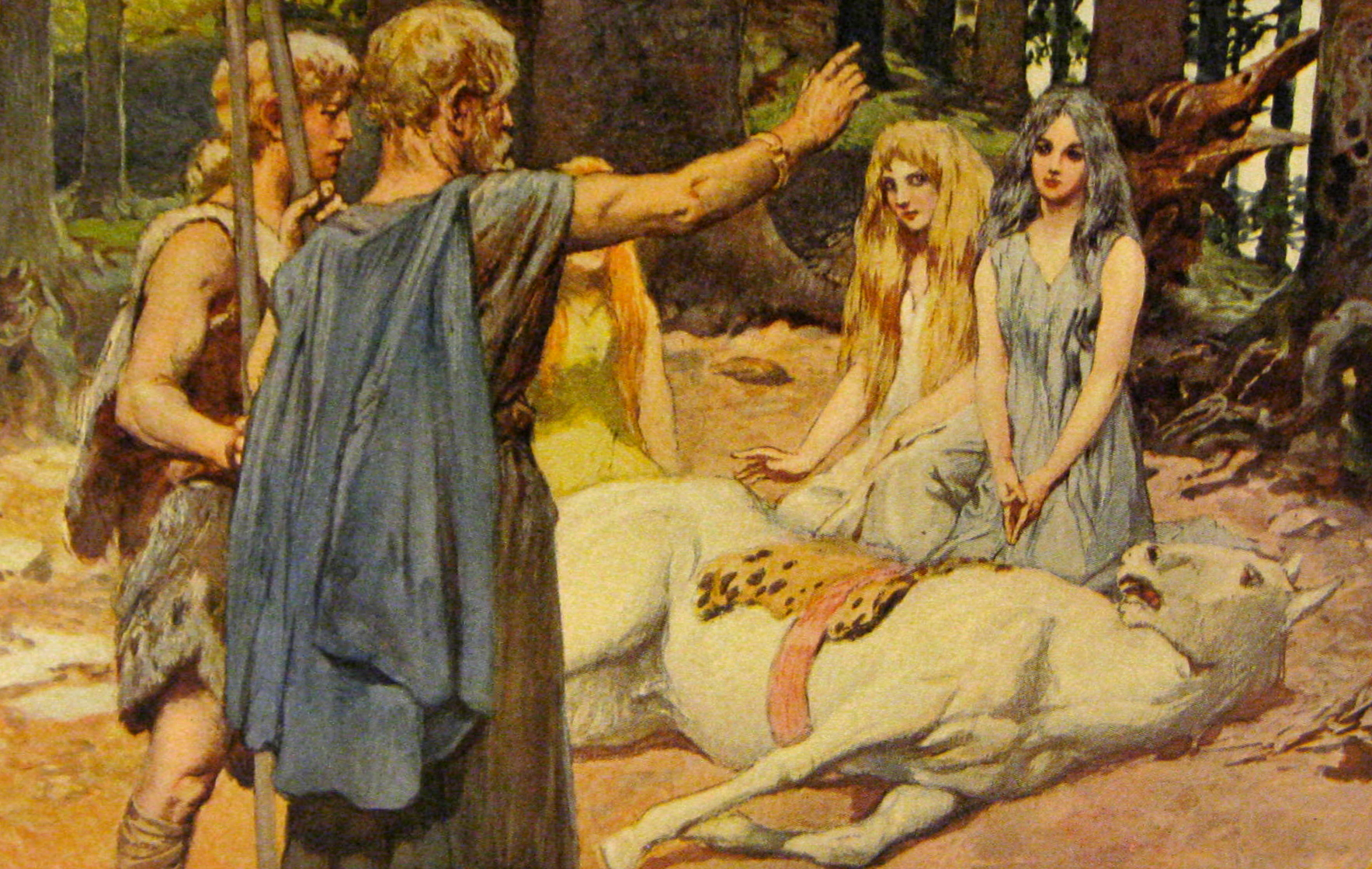Norse Goddess on:
[Wikipedia]
[Google]
[Amazon]
 In Germanic paganism, the
In Germanic paganism, the
* North, Richard (1997). ''Heathen Gods in Old English Literature''. Cambridge University Press * Orchard, Andy (1997). ''Dictionary of Norse Myth and Legend''. Cassell. * Simek, Rudolf (2007) translated by Angela Hall. ''Dictionary of Northern Mythology''.
 In Germanic paganism, the
In Germanic paganism, the indigenous religion
Indigenous religions is a category used in the study of religion to demarcate the religious belief systems of communities described as being "indigenous". This category is often juxtaposed against others such as the "world religions" and "new re ...
of the ancient Germanic peoples who inhabited Germanic Europe, there were a number of different gods and goddesses. Germanic deities are attested from numerous sources, including works of literature, various chronicles, runic inscriptions
A runic inscription is an inscription made in one of the various runic alphabets. They generally contained practical information or memorials instead of magic or mythic stories. The body of runic inscriptions falls into the three categories of El ...
, personal names, place names, and other sources. This article contains a comprehensive list of Germanic deities outside the numerous Germanic Matres and Matronae inscriptions from the 1st to 5th century CE.
Gods
Goddesses
Pseudo-deities and purported deities
*Astrild Astrild (from Old Norse: "Love-fire") is a relatively late Nordic name for Amor or Cupid. Astrild probably originated in the writings of the 17th-century Swedish poet Georg Stiernhielm, and has since been used in Nordic poetry, mainly during the ...
, a synonym for the Roman deity Amor
Amor ("love" in Latin, Spanish and Portuguese) may refer to:
Music Albums
* ''Amor'' (Julio Iglesias album), 1982
* ''Amor'' (Andrea Bocelli album), 2006
Songs
* "Amor" (Los Auténticos Decadentes song), 2000
* "Amor" (Cristian Castro song), 199 ...
or Cupid
In classical mythology, Cupid (Latin Cupīdō , meaning "passionate desire") is the god of desire, lust, erotic love, attraction and affection. He is often portrayed as the son of the love goddess Venus (mythology), Venus and the god of war Mar ...
invented and used by Nordic Baroque and Rococo authors
* Frau Berchta, a purported deity and female equivalent of Berchtold proposed by Jacob Grimm
* , a purported deity potentially stemming from a folk etymologyMeyers Großes Konversations-Lexikon, Band 2. Leipzig 1905, S. 832.
* Holda, a purported deity proposed by Jacob Grimm
* Jecha
Jecha is a surname. Notable people with the surname include:
* Asha Mshimba Jecha (born 1962), Tanzanian politician
* Mwadini Abbas Jecha, Tanzanian politician
* Ralph Jecha (1931–2018), American football player
{{surname
Surnames of African o ...
, a purported deity potentially stemming from a folk etymology
* Jofur
Jofur (from Old Norse ''Jöfurr'': "wild boar") is a name used in Nordic literature for the thunder god, mainly as a synonym for Jupiter. Jofur probably originated in the writings of the 17th-century Swedish scientist and writer Olaus Rudbeckius, ...
, a synonym for the Roman deity Jupiter invented and used by Nordic Baroque and Rococo authors
* Lahra, a purported deity potentially stemming from a folk etymology
* , a purported deity potentially stemming from a folk etymology
* Stuffo Stuffo is the name of a supposed Germanic god, who originates from various late medieval legends from Germany related to Saint Boniface.
Origin
Stuffo first appears in a few late medieval/early modern Bonifacian legends. A 1756 image of the god be ...
, a purported deity potentially stemming from a folk etymology
Related deities
*List of Anglo-Saxon deities
Anglo-Saxon deities are in general poorly attested, and much is inferred about the religion of the Anglo-Saxons from other Germanic peoples. The written record from the period between the Anglo-Saxon invasion of the British Isles to the Christian ...
* Common Germanic deities
Proto-Germanic folklore is the folklore of the speakers of Proto-Germanic and includes topics such as the Germanic mythology, legendry, and folk beliefs of early Germanic culture. By way of the comparative method, Germanic philology, Germanic philo ...
Notes
References
* Bellows, Henry Adams (Trans.) (1936). ''The Poetic Edda''. Princeton University Press. * Barnhart, Robert K (1995). ''The Barnhart Concise Dictionary of Etymology''. HarperCollins *Grimm, Jacob
Jacob Ludwig Karl Grimm (4 January 1785 – 20 September 1863), also known as Ludwig Karl, was a German author, linguist, philologist, jurist, and folklorist. He is known as the discoverer of Grimm's law of linguistics, the co-author of the ...
(James Steven Stallybrass Trans.) (1888). ''Teutonic Mythology: Translated from the Fourth Edition with Notes and Appendix by James Stallybrass''. Volume IV. London: George Bell and Sons.
* Lindow, John (2001). ''Norse Mythology: A Guide to the Gods, Heroes, Rituals, and Beliefs''. Oxford University Press.
* ''Nordisk Familjebok
''Nordisk familjebok'' (, "Nordic Family Book") is a Swedish encyclopedia that was published in print from between 1876 and 1993, and that is now fully available in digital form via Project Runeberg at Linköping University. Despite their consi ...
'' (1916). Available online* North, Richard (1997). ''Heathen Gods in Old English Literature''. Cambridge University Press * Orchard, Andy (1997). ''Dictionary of Norse Myth and Legend''. Cassell. * Simek, Rudolf (2007) translated by Angela Hall. ''Dictionary of Northern Mythology''.
D.S. Brewer
Boydell & Brewer is an academic press based in Woodbridge, Suffolk, England, that specializes in publishing historical and critical works. In addition to British and general history, the company publishes three series devoted to studies, edition ...
.
{{DEFAULTSORT:List Of Germanic Deities
Germanic paganism and mythology lists
Germanic deities
Germanic deities and heroes